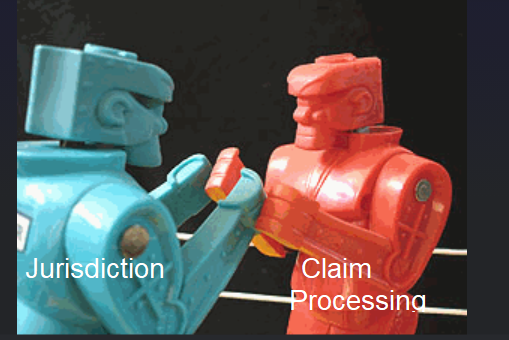The plaintiff in Arruda v. Curves Int’l alleged that violations of the Franchise Rule were RICO predicate acts, but the Fifth Circuit disagreed: “Congress’s omission of a private right of action in the [Federal Trade Commission Act] controls. A violation of the Franchise Rule does not itself constitute a predicate act of mail or wire fraud to support a RICO claim.” The Court cited D.C. Circuit opinion about the Service Contract Act that asked the cogent question: “If there is no implied cause of action for damages, how much the less for treble damages?” No. 20-50734 (June 28, 2021) (unpublished).
Monthly Archives: June 2021
 Huawei Technologies USA v. FCC presents an exhaustive summary of modern-day administrative law, in the context of reviewing an FCC rule that excluded Huawei from federal funds as a security risk. As the Court summarized its several holdings:
Huawei Technologies USA v. FCC presents an exhaustive summary of modern-day administrative law, in the context of reviewing an FCC rule that excluded Huawei from federal funds as a security risk. As the Court summarized its several holdings:
Their most troubling challenge is that the rule illegally arrogates to the FCC the power to make judgments about national security that lie outside the agency’s authority and expertise. That claim gives us pause. The FCC deals with national communications, not foreign relations. It is not the Department of Defense, or the National Security Agency, or the President. If we were convinced that the FCC is here acting as “a sort of junior varsity [State Department],” Mistretta v. United States, 488 U.S. 361, 427 (1989) (Scalia, J., dissenting), we would set the rule aside.
But no such skullduggery is afoot. Assessing security risks to telecom networks falls in the FCC’s wheelhouse. And the agency’s judgments about national security receive robust input from other expert agencies and officials. We are therefore persuaded that, in crafting the rule, the agency reasonably acted within the broad authority Congress gave it to regulate communications.
No. 19-60896 (June 18, 2021).
 The long and winding case of Doe v. McKesson, remanded from the Supreme Court with instruction to certify a threshold state-law question to the Louisiana Supreme Court, added one more state-law issue after remand. Doe v. McKesson, No. 17-30864 (June 25, 2021).
The long and winding case of Doe v. McKesson, remanded from the Supreme Court with instruction to certify a threshold state-law question to the Louisiana Supreme Court, added one more state-law issue after remand. Doe v. McKesson, No. 17-30864 (June 25, 2021).
Strong feelings were voiced about the Fifth Circuit’s panel opinion in Ramirez v. Guardarrama, 844 F. App’x 710 (5th Cir. 2021) (per curiam). The vote against en banc review was 13-4, with several opinions:
- Judge Jolly, who had been on the panel that found no Fourth Amendment violation, concurred with denial and observed: “The unanimous panel opinion also explains why we cannot quarterback from our Delphic shrines, three years later, the split-second decision making required of these officers in response to a suicidal man (1) doused in gasoline, (2) reportedly high on methamphetamine, (3) screaming nonsense, (4) holding a lighter, and (5) threatening to set himself on fire and to burn down the home, occupied by six people, which he had earlier covered in gasoline.”
- Judge Ho, joined by Judges Jolly and Jones, concurred and further observed: “[H]ow can a constitutional violation be ‘obvious,’ ‘egregious,’ and ‘conscience-shocking,’ when the dissent can’t tell the officers what they should have done differently to keep people safe?”
- Judge Oldham (also on the panel), joined by all of the above and Judge Engelhardt, reviewed the Fourth Amendment claim through a Twombly lens and concluded: “[T]he Fourth Amendment is not an antidote to tragedy. It’s a cornerstone of our Bill of Rights, with an august history and profound original meaning. We cheapen it when we treat it like a chapter from Prosser & Keeton. And we transmogrify it beyond recognition when we say officers act ‘unreasonably’ without any effort to say what a reasonable officer would’ve done.”
- Judge Smith dissented, arguing that this case provided an opportunity to revisit another recent en banc opinion.
- Judge Willett dissented, joined by Judges Graves and Higginson, pointing to recent Supreme Court cases that rejected qualified-immunity claims and observing: “The complaint alleges a plausible Fourth Amendment violation, and an obvious one at that. How is it reasonable—more accurately, not plausibly unreasonable—to set someone on fire to prevent him from setting himself on fire?”
 The defendant in IMA, Inc. v. Medical City Dallas sought to compel arbitration under a “direct-benefits estoppel” theory. It argued that the plaintiff’s claim, which involved a series of related contracts, necessarily implicated an agreement that contained an arbitration clause. The Fifth Circuit affirmed the denial of its motion to compel arbitration, agreeing that the defendant lacked “knowledge of the contract’s ‘basic terms,’ and noting: “IMA neither was shown to have, nor needed, knowledge of the Hospital Agreement in order to fulfill its obligations to the Health Plan and the IMAPPOplus Agreement; rather IMA could process the claims with ‘a copy of the [Health] Plan and the PPO Contract Rates.'” No. 20-20032 (June 17, 2021).
The defendant in IMA, Inc. v. Medical City Dallas sought to compel arbitration under a “direct-benefits estoppel” theory. It argued that the plaintiff’s claim, which involved a series of related contracts, necessarily implicated an agreement that contained an arbitration clause. The Fifth Circuit affirmed the denial of its motion to compel arbitration, agreeing that the defendant lacked “knowledge of the contract’s ‘basic terms,’ and noting: “IMA neither was shown to have, nor needed, knowledge of the Hospital Agreement in order to fulfill its obligations to the Health Plan and the IMAPPOplus Agreement; rather IMA could process the claims with ‘a copy of the [Health] Plan and the PPO Contract Rates.'” No. 20-20032 (June 17, 2021).
Retana, a Dallas police officer, sued several social-media companies after he was injured in a mass shooting. He alleged that Hamas radicalized the shooter through their platforms, and sought relief under the Anti-Terrorist Act. The Fifth Circuit affirmed dismissal, agreeing that the Dallas shooting was not “primarily outside the territorial jurisdiction of the United States” as the Act requires, and also found that the companies did not assist any terrorist group’s actions: “The shooting was committed by a self-radicalized ‘lone wolf’ … not by Hamas.” Retana v. Twitter, Inc., No. 19-11389 (June 16, 2021).
A wrongful-foreclosure case reminds of a basic Twombly principle: “Green’s breach-of contract claim in her complaint alleged that Defendants violated conditions in the deed of trust, but she never explained which part of the deed was violated. It was only in response to Defendants’ summary judgment motion that Green identified the deed’s notice requirement as the specific violation. Her failure to specify her breach-of-contract claim in her complaint warrants dismissal of that claim.” Green v. Windsor Park Asset Holding Trust, No. 20-11226 (June 18, 2021, unpublished) (per curiam).
The Supreme Court reversed a Fifth Circuit panel opinion about the constitutionality of the Affordable Care Act, finding that none of the plaintiffs had standing in light of (1) the repeal of coverage-related penalties and (2) the apparent mismatch between the ACA provisions complained of as unconstitutional, and those that caused the complained–of harms to the states. California v. Texas, No. 19-840 (U.S. Jun 17, 2021) (reversing Texas v. United States, 945 F. 3d 355 (5th Cir. 2019)).
 An important question about statutes bearing on the ability of a federal court to hear a matter is whether they are “jurisdictional,” or only speak to issues of “claim-processing.” See, e.g., Reed Elsevier, Inc. v. Muchnick, 559 U.S. 154 (2010). In Rivero v. Fidelity Investments, “[e]xamining the text and structure of the [Declaratory Judgment Act]’s federal-tax exception” led to the conclusion that it was jurisdictional: “[T]he statute plainly ‘speak[s] to the power of the court.’ … [T]he juxtaposition of the DJA’s reference to federal courts’ jurisdiction and the federal-tax exception indicates that the latter deprives a court of jurisdiction that might otherwise exist in cases ‘with respect to Federal taxes.'” The court also noted holdings in cases about a similarly-worded provision of the Anti-Injunction Act. No. 20-40371 (June 10, 2021) (citations omitted).
An important question about statutes bearing on the ability of a federal court to hear a matter is whether they are “jurisdictional,” or only speak to issues of “claim-processing.” See, e.g., Reed Elsevier, Inc. v. Muchnick, 559 U.S. 154 (2010). In Rivero v. Fidelity Investments, “[e]xamining the text and structure of the [Declaratory Judgment Act]’s federal-tax exception” led to the conclusion that it was jurisdictional: “[T]he statute plainly ‘speak[s] to the power of the court.’ … [T]he juxtaposition of the DJA’s reference to federal courts’ jurisdiction and the federal-tax exception indicates that the latter deprives a court of jurisdiction that might otherwise exist in cases ‘with respect to Federal taxes.'” The court also noted holdings in cases about a similarly-worded provision of the Anti-Injunction Act. No. 20-40371 (June 10, 2021) (citations omitted).
While this is a post about Texas state practice, I am cross-posting it from 600Commerce because it is of broad general interest to civil appellate practitioners.
With respect to court orders and judgments, the words “signed,” “rendered,” and “entered” are often used interchangeably. But those words have specific, technical meanings, and it is wise to remember those meanings when differences matter. Accord, Burrell v. Cornelius, 570 S.W.2d 382, 384 (Tex. 1978) (“Judges render judgment; clerks enter them on the minutes. … The entry of a judgment is the clerk’s record in the minutes of the court. ‘Entered’ is synonymous with neither ‘Signed’ nor ‘Rendered.’”).
Two rules set the background as to when critical countdowns commence:
- Tex. R. Civ. P. 306a: “The date of judgment or order is signed as shown of record shall determine the beginning of the periods prescribed by these rules for the court’s plenary power to grant a new trial or to vacate, modify, correct or reform a judgment or order and for filing in the trial court the various documents that these rules authorize a party to file …”
- Similarly, Tex. R. App. P. 26.1 begins: “The notice of appeal must be filed within 30 days after the judgment is signed, except as follows …”
By contrast, “[j]udgment is rendered when the trial court officially announces its decision in open court or by written memorandum filed with the clerk.” E.g., S&A Restaurant Corp. v. Leal, 892 S.W.2d 855, 857 (Tex. 1995) (per curiam). And the above-quoted paragraph from Rule 306a concludes: “… but this rule shall not determine what constitutes rendition of a judgment or order for any other purpose.”
By contrast, entry of judgment refers to the recording of a rendered judgment in the court’s official records. See, e.g., Lone Star Cement Corp v. Fair, 467 S.W.2d 402, 405 (Tex. 1971) (“The law is settled in this state that clerical errors in the entry of a judgment, previously rendered, may be corrected after the end of the court’s term by a nunc pro tunc judgment; however, judicial errors in the previously rendered judgment may not be so corrected.” (emphasis added)).
I gratefully acknowledge the excellent insights of Ben Taylor in preparing this post!
The able Rory Ryan of Baylor’s law school has Tweeted in detail about a recent district-court opinion on a thorny, and persistent, removal-jurisdiction issue. The case, which arose under a Texas Insurance Code provision with a specific procedure about claims against insurance agents, presented these facts:
Plaintiffs sued their insurer, Chubb (who is diverse), and agent, Smith (who is non-diverse), in state court. Chubb then elected to accept whatever liability Smith might have, and the state court dismissed Smith. Chubb then removed the case under diversity jurisdiction.
Leading to this issue: “[I]n determining diversity jurisdiction, does the Court consider Smith’s citizenship?”
After an extensive review of the relevant statutes and cases, the Court concluded:
Without binding authority, the Court must rely on the policy and rationale supporting the improper-joinder rule. The improper-joinder rule holds that the non-diverse defendant never should have been a party. As the Fifth Circuit has said: “If no reasonable basis of recovery exists, a conclusion can be drawn that the plaintiff’s decision to join the local defendant was indeed fraudulent …,” and therefore improper. As shown above, this rationale explains the improper-joinder rule’s past application.
But the rationale does not support an improper-joinder finding when the plaintiff’s claims against the non-diverse defendant were initially valid. In this situation, it is false to say an improper-joinder finding amounts to a determination that the non-diverse defendant was never properly before the court. It was.
(citations omitted, emphasis in original). The case was thus remanded to state court.
 If MoneyGram is a “bank” under the applicable Internal Revenue Code provision, it can take a large deduction that it cannot otherwise take. The Fifth Circuit did not agree with its claim to be a bank: “MoneyGram contends that when a customer buys a money order, the customer is placing funds with MoneyGram for safekeeping, at least until such time as the recipient of the money order presents it for payment. The tax court rejected this argument, likening a money order to the purchase of a gift card rather than a deposit in a bank account. We agree.” MoneyGram Int’l v. Commissioner of Internal Revenue, No. 20-60146 (June 1, 2021).
If MoneyGram is a “bank” under the applicable Internal Revenue Code provision, it can take a large deduction that it cannot otherwise take. The Fifth Circuit did not agree with its claim to be a bank: “MoneyGram contends that when a customer buys a money order, the customer is placing funds with MoneyGram for safekeeping, at least until such time as the recipient of the money order presents it for payment. The tax court rejected this argument, likening a money order to the purchase of a gift card rather than a deposit in a bank account. We agree.” MoneyGram Int’l v. Commissioner of Internal Revenue, No. 20-60146 (June 1, 2021).
 The Fifth Circuit harmonized two insurance-policy provisions in Miller v. Reliance Std. Ins. Co.:
The Fifth Circuit harmonized two insurance-policy provisions in Miller v. Reliance Std. Ins. Co.:
“[T]he phrase ‘active, full-time’ employees must be construed in the insured’s favor to include those who, on the relevant date, are current employees even if not actually working. We also agree that the term ‘regular work week’ must be construed to refer to an employee’s job description, or to his typical workload when on duty.
To hold otherwise, as Reliance urges, would render the second paragraph of the Transfer Provision virtually redundant with the first. On Reliance’s reading, the paragraph would cover employees who actually maintain a full-time work schedule at the time of transfer. But this is barely different, if at all, from the previous paragraph’s provision for employees who at the time are ‘Actively at Work,’ defined to mean ‘actually performing on a Full-time basis the material duties pertaining to his/her job'[.]
Effectively, Reliance’s reading is that the second paragraph covers employees who are not “actually performing” work duties but are ‘otherwise’ actually working. We reject this convoluted construction as the unambiguous meaning of the provision.”
No. 20-30240 (June 2, 2021) (emphasis in original, breaks added).
The Supreme Court affirmed the Fifth Circuit’s analysis of appellate costs (often a trivial issue, but here involving over $2 million in supersedeas-bond premiums) in City of San Antonio v. Hotels.com, stating: “[W]e hold that courts of appeals have the discretion to apportion all the appellate costs covered by Rule 39 and that district courts cannot alter that allocation.” No. 20–334 (U.S. May 27, 2021). (It remains to be seen how the Roberts Court will review other, more politically charged opinions from the Fifth Circuit this term.)
A party in Int’l Energy Ventures Mgmnt, LLC v. United Energy Group, Ltd. “recognize[d] the general proposition that litigation-conduct waiver is an issue that should be decided by the court,” but “contend[ed] that the general rule does not apply here for three reasons.” The Fifth Circuit rejected each one:
- Incorporation of AAA rules. Yes, the parties’ agreement gave the arbitrator “the power to rule on its own jurisdiction,” but it did not “clearly and unmistakably” confer the power to decided litigation-conduct waiver.
- Waiver. Again, the Court found that activity during the arbitration did not “clearly and unmistakably” result in the “submission” of this issue, noting reservations made by the relevant party and the arbitrator’s own actions.
- “Unique facts.” The Court did not find key cases inapplicable because of the party who sought arbitration: “‘Arbitration is a matter of contract,'” reasoned the Court, and “[e]xtra-contractual factors–like where an issue first arises and who initiates arbitration–are not part of the interpretive analysis.”
No. 20-20221 (May 28, 2021).